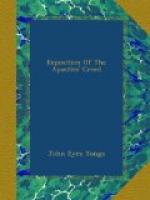In being born, Jesus assumed the nature of humanity, and, in so doing, more than restored to man the likeness to God which our first parents lost, for themselves and their descendants, through the Fall. He thereby made it possible for God to dwell with man, and for man to rise into communion with God. Sin had effaced the Divine image, and no other than the Son of God could give back to men the power to reflect in their own lives the character of God. His possession of the human nature gives us confidence in approaching Him, by assuring us of His brotherhood and sympathy; while His possession of the Divine nature assures us that He can make His brotherhood and sympathy effectual.
* * * * *
ARTICLE 4
Suffered under Pontius Pilate, was crucified, dead, and buried
SECTION 1.—SUFFERED UNDER PONTIUS PILATE
The preceding articles of the Creed appeal to faith. They so far transcend reason that they can be apprehended only when reason is sustained by faith. This article, which affirms that Jesus “suffered under Pontius Pilate, was crucified, dead, and buried,” is a simple historical statement. Pilate is a historic person, the details of whose life are recorded, not in the Gospels only, but in secular history. Josephus records several incidents in the life of Pilate which are strikingly in accordance with his character as set forth in the Gospels. Tacitus, a Roman historian, who wrote his Annals soon after the crucifixion of Jesus, relates that, while Pilate was governor of Judaea, Jesus Christ was put to death. The testimony of the Gospels and the statement of the Creed are thus confirmed by the Roman and the Jewish historians. But, indeed, the event itself is not the subject of controversy. It is the conclusions drawn from it by the followers of Christ that are disputed. “Christ crucified, to the Jews a stumbling-block, and to the Greeks foolishness,"[081] still raises opposition and kindles hostility.




